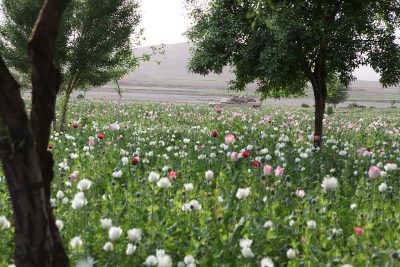Drugs Crisis in Iran emanating from Afghanistan: Sharia, Narcotics, and Shadow of NATO
Boutros Hussein, Noriko Watanabe, and Lee Jay Walker
Modern Tokyo Times
The Islamic Revolution in Shia Iran was meant to usher in a society based on conservative Muslim morals based on Sharia Islamic law. Yet, many decades later then clearly “emptiness” and “disillusionment” is rife in Iran. At the same time, it highlights the reality that Sunni Islamist terrorist groups and crime syndicates in Afghanistan provide “a real glimpse” into hypocritical morals that exist in this nation.
Indeed, drug and alcohol abuse blight nations irrespective if democratic states or Islamic Sharia states. Of course, alcoholic abuse is more predominant in non-Sharia states. However, with Afghanistan being a paradise for narcotics – and with Iran suffering greatly from drug abuse – then the morality angle is clearly a figment of the imagination.
It equally says little for NATO because countless nations have military personnel in Afghanistan. Despite this, the trade in narcotics is a blossoming reality year on year. Therefore, the Russian Federation is worried by the intrigues of NATO powers and Sunni Islamist terrorist groups, that may expand the drug trade to Central Asia and the Russian Federation based on ulterior motives.
According to sources in Iran, it is now claimed that you have at least 2.8 million citizens who take drugs on a regular basis. This figure, it appears, may even underestimate the crisis being fueled by Sunni Islamist channels and crime syndicates in Afghanistan (and channels linking Pakistan). Indeed, European nations tolerating mass immigration to this continent are paving the way for even greater criminal activity from this part of the world.
The BBC says, “Afghanistan produces some 90% of the world’s opium, which is extracted from poppy resin and refined to make heroin… Iran is a major transit point for Afghan-produced opiates heading to Europe.”
In 2010 the Russian Federation pleaded for a mandate to tackle opium crops in Afghanistan. Yet, for estranged reasons – given vast economic aid to Afghanistan – NATO refused the request.
Reuters reports, “Russia’s anti-drugs czar, Victor Ivanov, met NATO ambassadors in Brussels and proposed that NATO troops be given a U.N. mandate and an obligation to eradicate Afghan opium crops, which were killing 30,000 Russians a year.”
The NATO spokesperson at the time of the request by the Russian Federation, James Appathurai, while expressing sympathy with Moscow, still declined to take serious action. He stated, “We cannot be in a situation where we remove the only source of income of people who live in the second poorest country in the world without being able to provide them with an alternative.”
Turning back to narcotics and criminal syndicates under the vestiges of Sunni Islamism – be it ISIS (Islamic State – IS), al-Qaeda, the Taliban, or other Sunni Islamist terrorist groups – then clearly Gulf, NATO, and Pakistan-backed failed states are breeding grounds for chaos. Given this reality, the expansion of Sunni Islamic terrorism, narcotic profit windfalls for terrorist groups, and powerful crime syndicates that seek to spread chaos are all gaining from outside intervention. Therefore, narcotics and crime syndicates from Afghanistan to Kosovo have spread based on outside military intervention – with Sunni Islamism gaining ground in the shadows of the usual destabilizing powers.
Shia clerics in Iran equally need to admit failures because the people of this nation need aspirations to be met. Equally important, the state apparatus of Iran must help in the fight against narcotics, instead of easy slogans that lambast America and the West. After all, certain Gulf powers and Sunni Islamic terrorist groups are all anti-Shia by nature. Therefore, if Shia clerics ignore bread and butter issues in Iran, the only losers will be the people of this nation because a narcotics vacuum will enter at increasing rates.
Ironically, it appears that Sharia law advocates are unwilling in Afghanistan and Iran – or aren’t focused enough – to stem the tide of narcotics. Hence, millions of Iranians are suffering from issues related to drug abuse. Given this reality, Muslim clerics from both branches in Afghanistan and Iran need to tackle the serious reality of narcotics that is blighting the region based on different factors. If not, then the crisis will further increase and set the region further back – while boosting the coffers of Sunni Islamic sectarian forces.
Equally important, serious questions must be raised at NATO powers and the role of Pakistan in the internal affairs of Afghanistan. This applies to why narcotics is growing under the nose of NATO in Afghanistan – and why Pakistan is tolerating safe havens for Sunni Islamic groups in order to destabilize Afghanistan.
http://www.bbc.com/news/world-middle-east-40397727
http://www.reuters.com/article/uk-nato-russia-afghanistan-idUKTRE62N56U20100324
Modern Tokyo News is part of the Modern Tokyo Times group
DONATIONS to SUPPORT MODERN TOKYO TIMES – please pay PayPal and DONATE to sawakoart@gmail.com
http://moderntokyotimes.com Modern Tokyo Times – International News and Japan News
http://sawandjay.com Modern Tokyo Times – Fashion
https://moderntokyonews.com Modern Tokyo News – Tokyo News and International News
http://global-security-news.com Global Security News – Geopolitics and Terrorism
PLEASE JOIN ON TWITTER
https://twitter.com/MTT_News Modern Tokyo Times
PLEASE JOIN ON FACEBOOK

